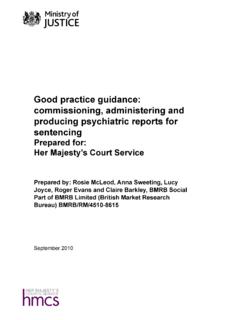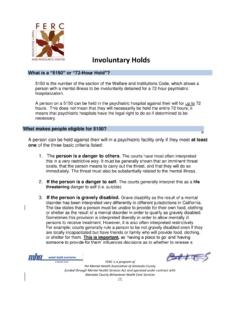Transcription of The National Association of Psychiatric Intensive Care ...
1 The National Association of Psychiatric Intensive Care & Low Secure Units(NAPICU)The NAPICU Executive Committee (EC) is multidisciplinary and includes clinicians, managers, service user representatives and carers. The EC meets four times per year to take forward projects, respond to consultation documents and debate wider policy issues. The current membership of the NAPICU EC is comprised of:Chair: Dr Stephen PereiraVice Chair: Dr Faisil SethiTreasurer: Mr Alan MetherallDeputy Treasurer: Ms Tina BensonEditor in Chief (Journal of PIC): Mr Roland DixDirector of Operations: Mrs Caroline Parker Director of Policy: Mr Mathew PageDirector of Educational Programmes: Dr Aileen O BrienDirector of Research: Dr Stephen DyeDirector of Scientific Programmes: Mr Thomas KearneyDeputy Director of Scientific Programmes: Dr Dinal VekariaPatient Representative: Mr Bernard FoxCarer Representatives.
2 Dr Ratna Sakya Mrs Padma SakyaExecutive Member (Membership Lead): Mr Chris DzikitiExecutive Member (AIMS-PICU Lead): Mr Paul DeaconExecutive Member (Communications Lead): Dr Daniel HumeExecutive Members: Dr Paul Birkett Mr Andy Johnston Mr Peter PrattThe National Association of Psychiatric Intensive Care & Low Secure Units (NAPICU) is a truly multidisciplinary, clinician-lead organisation committed to the development of Psychiatric Intensive care (PIC) and low secure (LS) services. The aim of NAPICU is to advance the care and treatment of people who require PIC and LS care in acute services. NAPICU achieves this through promoting and sharing good practice, providing education and training, encouraging clinicians to establish networks, and by undertaking research and creation of NAPICU was driven by the need for standard-setting in Psychiatric Intensive Care Units (PICU) and LS services.
3 NAPICU was formally established in 1996 by Dr Dominic Beer, Dr Stephen Pereira and Carol Paton and began discussion among clinicians regarding standards of care, ethical issues, service specifications and patient profiles within PICU and LS disparity between units of that era was highlighted by a survey published in 1997 (Beer et al. 1997). A PICU policy, research and development group was established at the North East London Foundation Trust by Dr Stephen Pereira in 1999. This group conceptualised and initiated a project to develop the National Minimum Standards in Psychiatric Intensive care and low secure environments given the absence of such National standards in the UK.
4 A multidisciplinary group of clinicians in the field of Psychiatric Intensive care and low secure care was established and produced clinical standards, which were subsequently adopted by the Department of Health in 2001. The National Minimum Standards in Psychiatric Intensive care units and low secure environments was launched as a policy implementation guide in 2002 (DOH 2002, editors Dr Stephen Pereira & Colum Clinton). This group also initiated the PICU and low secure practice development network to help units meet with the National standards. The main aim of the 2002 National Minimum Standards was to develop standards of Psychiatric Intensive care and low secure environments with a multidisciplinary and patient focus.
5 The National Minimum Standards have influenced the successful development of Psychiatric Intensive care units and low secure environments in a standardised manner across the UK, whilst allowing for local creativity and innovation ultimately leading to high quality care for patients who find themselves in these environments. After a lengthy process of engagement with all stakeholders these standards have now been revised and published in 2014 as the National Minimum Standards for Psychiatric Intensive Care in General Adult Services Updated 2014. Appendix 1 lists the sections contained within the National Minimum Standards of is also now in the process of undertaking another National Survey of PICU and LS care across the UK.
6 The intention is that this will be combined with benchmarking tools to enable local services to assess their own performance against National 1996 NAPICU has worked to achieve its aims by promoting: the development of PICU and LS services, the clinicians working within these services and most importantly by improving the experience of patients within these services. NAPICU EXECUTIVE COMMITTEETHE National Association OF Psychiatric Intensive CARE & LOW SECURE UNITS (NAPICU)The Governance Network and AIMS-PICU AccreditationIn the implementation section of the National Minimum Standards of 2002, mention is made of the development of a PICU / LS Practice Development Network being a way to monitor implementation of the standards.
7 To achieve this end this project was conceptualised by Dr Stephen Pereira and he made a successful bid for a research grant from the National Institute for Mental Health in England (NIMHE), money was secured for one year to pilot and develop a system in which individual service improvements could be shared and implemented by PIC and LS services on a wider developed into a Governance Network focusing on eight units around England, concentrating on four themes: multidisciplinary working, diversity, service user / carer involvement and emergency response ( Psychiatric and physical), using the National Minimum Standards as a benchmark.
8 The Network continued for a second year and led to the development of the Psychiatric Intensive Care Advisory Service which gave advice and help to many individual units in a similar fashion to the Network. This was in collaboration with the Royal College of Psychiatrists and could be seen as the forerunner to the AIMS-PICU accreditation system (described below).NAPICU has worked with the Royal College of Psychiatrists Centre for Quality Improvement (CCQI) to devise a quality framework tool for PICUs; the AIMS-PICU Standards Document. The CCQI s National initiatives set standards for the organisation and delivery of mental health services.
9 The CCQI has developed a standards-based accreditation service to improve the quality of care in Psychiatric wards; this is the Accreditation for Inpatient Mental Health Services (AIMS). AIMS-PICU promotes local accountability and focuses on the development of PICU services. AIMS-PICU as a quality assurance and monitoring tool can drive service improvement and support the commissioning of services. NAPICU works in partnership with the CCQI to update these standards on a regular basis providing up-to-date expertise and the latest evidence base in PICU practice. Appendix 2 gives details of the AIMS-PICU accreditation Journal of Psychiatric Intensive Care and Low Secure UnitsPublished bi-annually, the Journal of Psychiatric Intensive Care and Low Secure Units is the official publication of NAPICU in Association with Cambridge University Press.
10 The Journal has gone from strength to strength since its inception in 2005, and to this day is the only worldwide journal in this area of clinical practice. The Journal s editorial board includes eight members of the NAPICU Executive Committee alongside nineteen leading international contributors. The membership of the editorial board reflects the strength of NAPICU as a truly multidisciplinary organisation. The Journal is devoted to issues affecting the care and treatment of people with mental disorder who manifest severely disturbed mental or behavioural functioning. It serves the interests of all professionals concerned with these topics whether they work in PICUs, LS services, acute inpatient wards, challenging behaviour services or emergency psychiatry.







